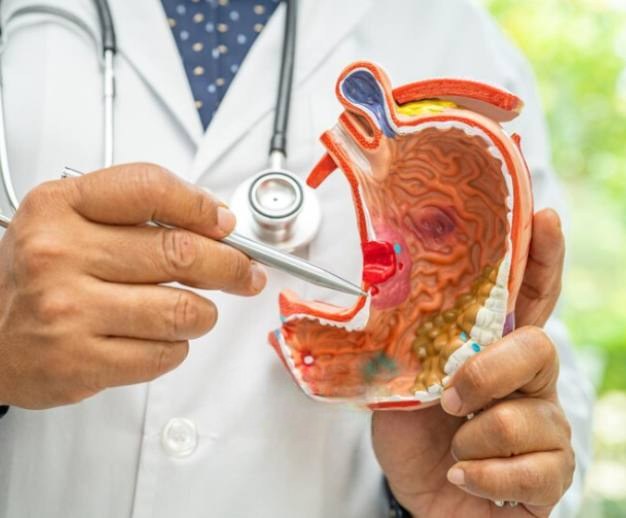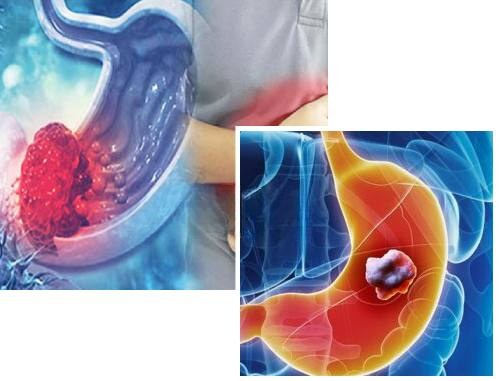Stomach Cancer

Stomach Cancer Doctor in Kolkata
Stomach cancer is also known as gastric cancer which is a serious health condition that affects the stomach’s lining due to abnormal cell growth. This type of cancer often develops at an advanced stage. So it is essential to be aware of its signs, symptoms and causes to facilitate effective early diagnosis and treatment. The stomach oncologist in Kolkata gives importance to awareness of stomach cancer symptoms and causes for better medical intervention and results.
What is Stomach Cancer?
Stomach cancer occurs when abnormal cells in the stomach grow rapidly, forming tumours. These tumours can be either malignant (cancerous) or benign (non-cancerous). Malignant tumours can damage nearby tissues and spread to other parts of the body. Early detection is critical for effective stomach cancer management.
What is Stomach Cancer?
It is necessary to recognise stomach cancer’s early symptoms for immediate treatment options. Here are some common symptoms to watch for:
Early Symptom
Early signs can be subtle, including constant indigestion, stomach discomfort, or bloating. Many people can attribute these symptoms to less serious conditions.
Advanced Symptoms
As the cancer progresses, more severe symptoms may develop, such as:
- Unexplained weight loss
- Difficulty swallowing
- Nausea and vomiting, which may include blood
- Fatigue
- Loss of appetite
- Abdominal pain
Stomach Cancer Symptoms in Females
Women may experience unique symptoms related to stomach cancer, such as a feeling of fullness after eating little amount of food.
If you experience these symptoms, especially if they stay or worsen, you need to consult a stomach oncologist in Kolkata for further evaluation.


Stomach Cancer Causes
The exact cause of stomach cancer depends on many factors. Let us discuss several reasons that can increase the risk of developing stomach cancer.
Age
Stomach cancer is more common in individuals over the age of 55.
Gender
Men are at a higher risk than women.
Family History
A family history of stomach cancer or other gastrointestinal cancers can increase risk.
Diet
Diets high in smoked foods, and pickled vegetables, and low in fruits and vegetables have been linked to higher incidence rates.
Infection
Infection with Helicobacter pylori bacteria that can cause chronic inflammation in the stomach is a significant risk factor.

Stomach Cancer Diagnosis
It is a very common question whether stomach cancer is curable or not. So, it is necessary to understand the type and stage of stomach cancer through several tests and examinations.
Medical History and Physical Exam
The doctor will ask about your symptoms, family history, and conduct a physical examination.
Endoscopy
A flexible tube with a camera is inserted into the stomach to examine the lining and collect tissue samples (biopsy).
Imaging Tests
Techniques such as CT scans, MRI, or X-rays help visualize the stomach and check for signs of cancer.
Biopsy
This is a definitive test where tissue is sampled during an endoscopy and examined for cancer cells.

Stomach Cancer Types
There are several types of stomach cancer types which include:
Adenocarcinoma
This is the most common type, arising from the glandular cells in the stomach lining.
Gastric Lymphoma
This type originates in the lymphatic tissue of the stomach.
Gastrointestinal Stromal Tumours (GISTs)
Rare tumours that develop from interstitial cells of Cajal in the stomach wall.
Stomach Cancer Treatment Options
The treatment of stomach cancer depends on the stage and type of cancer, as well as the patient’s overall health. Here are the primary treatment modalities:
Chemotherapy
Stomach cancer chemotherapy is a process in which drugs are used to kill cancer cells.
Radiation Therapy
High-energy rays target and destroy cancer cells. This may be used in conjunction with other treatments.
Targeted Therapy
This treatment focuses on specific characteristics of cancer cells, such as genetic mutations.

Stomach Cancer Stages
It is crucial to identify its stages to improve the stomach cancer recovery rate. Let us explore the stages of stomach cancer.
- Stage 0: Early cancer confined to the inner lining.
- Stage I: Cancer has spread to nearby tissues or lymph nodes.
- Stage II: More extensive invasion of the stomach and surrounding tissues.
- Stage III: Advanced cancer that has spread to nearby organs and multiple lymph nodes.
- Stage IV: Metastatic stomach cancer that has spread to distant parts of the body, like the liver or lungs.
Stomach Cancer Recovery Rate
The stomach cancer recovery rate can vary based on the stage at diagnosis and the effectiveness of treatment. Early-stage stomach cancer has a better prognosis, while late-stage (like stage 4 stomach cancer) has a lower survival rate. It’s crucial to discuss your specific situation with the doctor to understand your options.
Stomach cancer is a serious condition that demands quick treatment options for successful recovery. If you or a loved one is experiencing symptoms, don’t hesitate to reach out for stomach cancer treatment in Kolkata. The stomach oncologist in Kolkata, is here to provide comprehensive care according to your needs. Together, we can overcome this challenging journey towards recovery.
Frequently Asked Questions
What are the cells of the Cajal layer?
The cells of the Cajal layer, also known as interstitial cells of Cajal (ICC), are specialized pacemaker cells located in the gastrointestinal tract. They play a crucial role in regulating intestinal motility by generating electrical signals that coordinate smooth muscle contractions. ICC helps establish the basic rhythm of gut contractions and contributes to peristalsis, making them essential for digestive processes.
Is stomach cancer usually fatal?
Stomach cancer can be fatal, particularly if diagnosed at an advanced stage. The prognosis varies based on several factors, including the cancer’s stage at diagnosis and the patient’s overall health. Generally, the survival rate for stomach cancer is lower than for many other cancers, with a five-year survival rate of around 30% for all stages combined, but it can be significantly higher for early-stage cases.
Is stomach cancer painful?
Stomach cancer can cause pain, but the level of discomfort varies among individuals. Many patients experience symptoms such as abdominal pain, bloating, and discomfort, especially as the disease progresses. While some people may have mild symptoms, others may experience significant pain, particularly in later stages.
How to check stomach cancer?
To check for stomach cancer, medical professionals usually perform several diagnostic tests. These may include an endoscopy, where a thin tube with a camera is inserted into the stomach to look for abnormalities, as well as imaging tests like CT scans or MRIs to visualize the stomach and surrounding areas. Additionally, a biopsy may be performed during an endoscopy to test for cancerous cells.
Do blood tests show stomach cancer?
Blood tests alone cannot definitively diagnose stomach cancer, but they can provide important information about a person’s overall health. Tests may check for anaemia, which can be a sign of cancer, and specific tumour markers, like CA 19-9, can be elevated in stomach cancer patients. However, a definitive diagnosis generally requires imaging tests and a biopsy to confirm the presence of cancerous cells.


